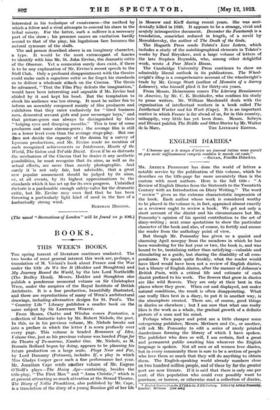BOOKS.
THIS WEEK'S BOOKS.
THE spring torrent of literature continues unabated. The two books of most general interest this week are, perhaps, a translation of M. Viviani's book about France and the War under the title As We See It (Hodder and Stoughton) and My Journey Round the World, by the late Lord Northcliffe (The Bodley Head). Messrs. Hodder and Stoughton also publish a ponderous memorial volume on Sir Christopher Wren, under the auspices of the Royal Institute of British Architects. It is a fine production, beautifully illustrated, and there are reproductions of many of Wren's architectural drawings, including alternative designs for St. Paul's. The " Country Life " Library publishes a smaller book on the &sine subject by Sir Lawrence Weaver.
From Messrs. Chatto and Windus comes Fantastica, a collection of fantastic tales by Mr. Robert Nichols, the poet. In this, as in his previous volume, Mr. Nichols breaks out into a preface in which the letter I is- sown profusely over every page. This volume is headed Romances of Idea, Volume One, just as his previous volume was headed Plays for the Theatre of To-morrow, Number One. Mr. Nichols, as M. Romain Rolland began by doing, appears to be planning his future production on a large scale. Plays Near and Far, by Lord Dunsany (Putnam), includes If, a play in which Miss Gladys Cooper gave such a fine performance last year. Mr. Jonathan Cape sends another volume of Mr. Eugene O'Neill's plays—The Hairy Ape—containing, besides the title-play, " The First Man " and " Anna Christie," which is at present attracting so much attention at the Strand Theatre. The Diary of Nellie Ptaschkina, also published by Mr. Cape, is a translation of the diary of a young Russian girl of her life in Moscow and Kieff during recent years. She was acci- dentally killed in 1920. It appears to be a strange, vivid and acutely introspective document. December the Fotirteenth is a translation, somewhat reduced in length, of a novel by Merezhkovsky, the author of The Death of the Gods.
The Hogarth Press sends Tolstoi's Love Letters, which includes a study of the autobiographical elements in Tolstoi's works by Paul Biryukov, and a large volume of letters of the late Stephen Reynolds, who, among other delightful work, wrote A Poor Man's House.
The Cambridge University Press continues to show an admirably liberal outlook in its publications. The Wheel- wright's Shop is a comprehensive account of the wheelwright's trade by Mr. George Sturt (author of Memoirs of a Surrey Labourer), who himself plied it for thirty-six years.
From Messrs. Heinemann comes The Literary Renaissance in America, by Mr. C. E. Bechhofer, who confines his study to prose writers. Mr. William Macdonald deals with the organization of intellectual workers in a book called The Intellectual Worker and his Work (Cape). It is an important matter in which France is far ahead of us, for in this country, unhappily, very little has yet been done. Messrs. Selwyn. and Blount publish The Riddle and Other Stories by Mr. Walter


















































 Previous page
Previous page